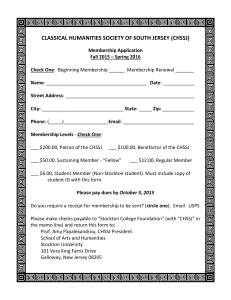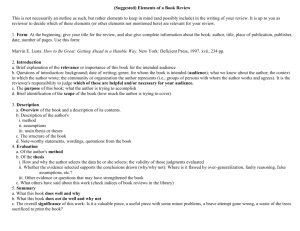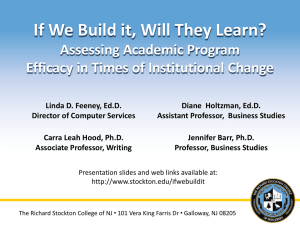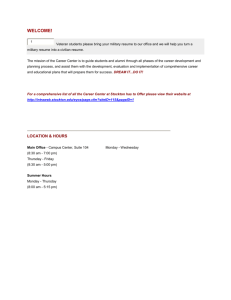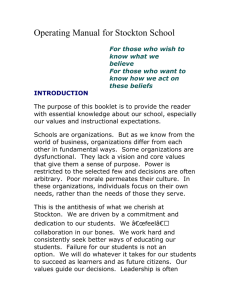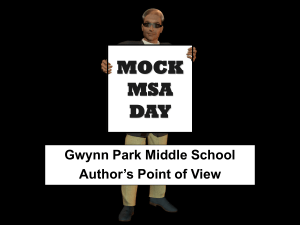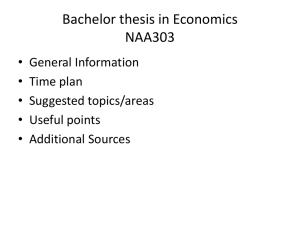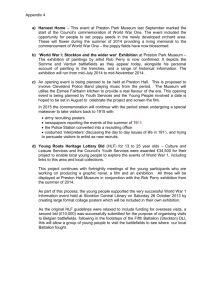History Program Assessment of Student Learning Senior Thesis
advertisement
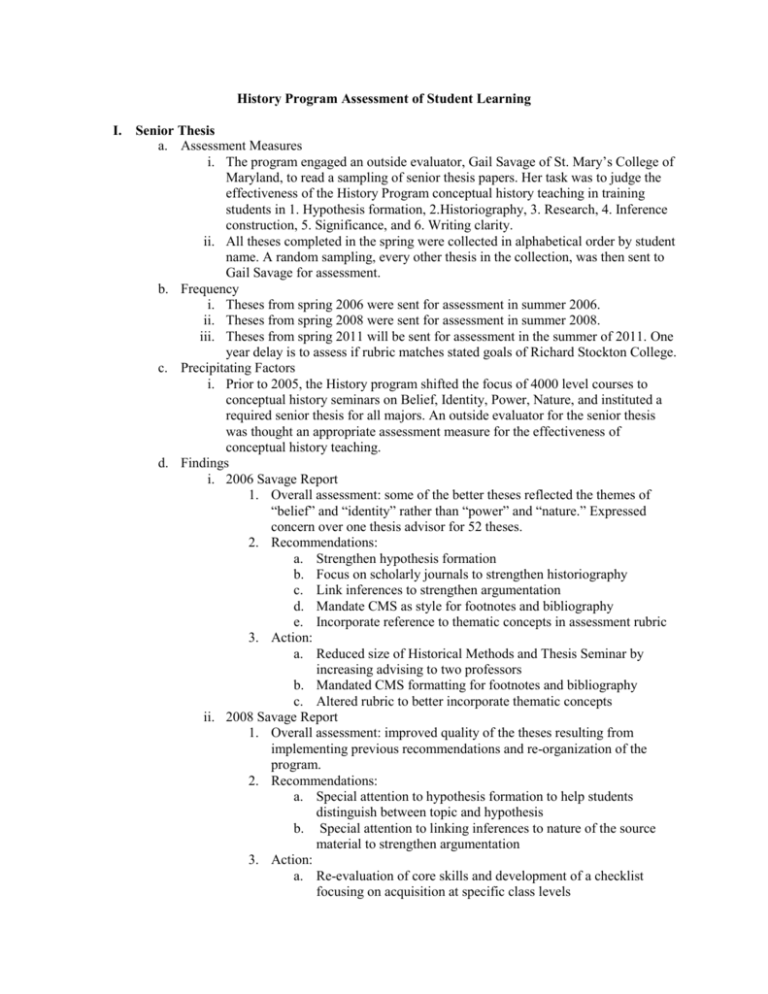
History Program Assessment of Student Learning I. Senior Thesis a. Assessment Measures i. The program engaged an outside evaluator, Gail Savage of St. Mary’s College of Maryland, to read a sampling of senior thesis papers. Her task was to judge the effectiveness of the History Program conceptual history teaching in training students in 1. Hypothesis formation, 2.Historiography, 3. Research, 4. Inference construction, 5. Significance, and 6. Writing clarity. ii. All theses completed in the spring were collected in alphabetical order by student name. A random sampling, every other thesis in the collection, was then sent to Gail Savage for assessment. b. Frequency i. Theses from spring 2006 were sent for assessment in summer 2006. ii. Theses from spring 2008 were sent for assessment in summer 2008. iii. Theses from spring 2011 will be sent for assessment in the summer of 2011. One year delay is to assess if rubric matches stated goals of Richard Stockton College. c. Precipitating Factors i. Prior to 2005, the History program shifted the focus of 4000 level courses to conceptual history seminars on Belief, Identity, Power, Nature, and instituted a required senior thesis for all majors. An outside evaluator for the senior thesis was thought an appropriate assessment measure for the effectiveness of conceptual history teaching. d. Findings i. 2006 Savage Report 1. Overall assessment: some of the better theses reflected the themes of “belief” and “identity” rather than “power” and “nature.” Expressed concern over one thesis advisor for 52 theses. 2. Recommendations: a. Strengthen hypothesis formation b. Focus on scholarly journals to strengthen historiography c. Link inferences to strengthen argumentation d. Mandate CMS as style for footnotes and bibliography e. Incorporate reference to thematic concepts in assessment rubric 3. Action: a. Reduced size of Historical Methods and Thesis Seminar by increasing advising to two professors b. Mandated CMS formatting for footnotes and bibliography c. Altered rubric to better incorporate thematic concepts ii. 2008 Savage Report 1. Overall assessment: improved quality of the theses resulting from implementing previous recommendations and re-organization of the program. 2. Recommendations: a. Special attention to hypothesis formation to help students distinguish between topic and hypothesis b. Special attention to linking inferences to nature of the source material to strengthen argumentation 3. Action: a. Re-evaluation of core skills and development of a checklist focusing on acquisition at specific class levels b. Discussed creation of possible ISH (Introductory Seminar in History) classes based on model of current Transfer Seminar courses c. Discussed if current rubric matches goals of Stockton d. Discussed possible need to change outside evaluator for different perspective II. CLA a. Assessment Measures i. Campus wide proctored essay exam given to seniors in the spring semester. Participation is voluntary. Skills assessed include identifying issues and information, organizing information, making a persuasive argument or an objective analysis about an issue, presenting clear and well thought out recommendations for a course of action, and explaining the basis and rationale for these recommendations. ii. Reports are based on sample size of 100 seniors. iii. 14 history majors participated in 2008 iv. 19 history majors participated in 2010 b. Frequency i. Spring 2008 ii. Spring 2010 c. Precipitating Factors i. (Information not available as to why Stockton uses the CLA) d. Findings i. Spring 2008 1. (data not available) ii. Spring 2010 1. History students spent an average of 40 minutes on the exam 2. Average GPA of test takers was 3.33 3. Performance task = 1149/ analytic writing = 1257 4. Stockton senior history majors scored slightly better than the average student at Stockton on the performance task. 5. They scored slightly worse than the average college student on the performance task. 6. They scored much higher, on average, than seniors at Stockton on analytic writing. 7. They scored slightly better than the national average on analytic writing. III. IDEA a. Assessment Measures i. Mandatory assessment for all faculty who provide a relevance rating (Essential, Important, Minor or no importance) for each of 12 learning objectives included on the IDEA form. ii. Students rate their progress on these objectives and provide additional information about teaching methods, course characteristics, and their own characteristics. iii. Scores are released to individual faculty. b. Frequency i. Every course for untenured faculty ii. Selected courses for tenured faculty c. Precipitating Factors i. (Information not available as to why Stockton uses the IDEA) d. Findings i. History has requested a compilation of IDEA scores for all 4000 level courses for the last three years as another method of evaluating conceptual history teaching. ii. Upon receipt of IDEA scores, a program meeting will be scheduled to discuss results and develop an action plan. IV. Self-Assessment for Individual Classes a. Assessment Measures i. Prof. Rosner assessed classroom use of Google applications including gmail, Google docs, Google calendar, iGoogle, and Google groups. A questionnaire was given to all three of her classes in Fall ’09. b. Frequency i. One time assessment in Fall ’09. c. Precipitating Factors i. Prof. Rosner attended a Tech Academy workshop in the summer of 2009. ii. Prof. Rosner sought an easier method of dialoguing with the class that can be preserved for future reference iii. Prof. Rosner wanted to an address issue raised by a survey of graduating Stockton students indicating they had not improved their knowledge of technology while at Stockton. d. Findings i. 95% thought Google docs were very useful for studying for exams ii. 25% made specific recommendation that it would be more useful if all students participated in answering sample questions. iii. 74% found a gmail account useful for the course iv. 60% used Google calendar for the syllabus, often citing it was too cumbersome to maintain v. 36% used iGoogle as a home page vi. A total of 8 students used Google groups for online discussion, citing they prefer classroom discussion for HIST and GAH courses e. Action i. All students were required to answer sample questions in spring of 2010. ii. Google calendar was dropped from use in spring of 2010. iii. The use of iGoole was omitted in spring of 2010
